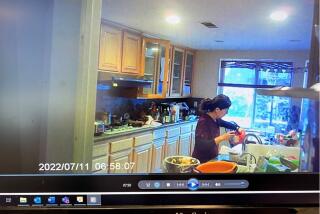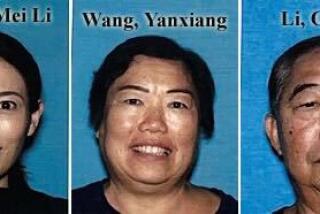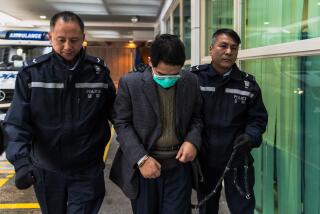China inquiry into British man’s death may include blood samples
BEIJING — The sensational Chinese murder investigation in which the wife of an ousted Politburo member stands accused of poisoning a British expatriate may include evidence from blood samples taken from the victim’s body before cremation, according to people familiar with the case.
Henry C. Lee, a forensic scientist who gained international recognition for his work in the O.J. Simpson murder trial, said that he was asked this year to analyze a blood sample that most probably came from Neil Heywood, the dead Englishman.
“They said somebody died of drinking,” said Lee in a telephone interview from his office in New Haven, Conn. “They had a blood sample. They wanted to know whether or not we can assist them to determine the type of poison in the sample.”
Heywood, 41, was found dead Nov. 15 in a hotel frequented by Communist Party officials in Chongqing, in southern China. He was initially ruled to have had a heart attack brought about by excessive alcohol consumption, but his family insisted he was a light drinker. His body was cremated Nov. 18 in the presence of a representative from the British Embassy and the ashes were flown to London.
In mid-January, Wang Lijun, the police chief in Chongqing, began to suspect that Heywood was murdered and that the wife of Bo Xilai, Chongqing’s powerful party secretary at the time, was involved. He confronted Bo with his suspicions, who in turn had him fired from his position as deputy mayor of Chongqing. Fearing his life was in danger, Wang took refuge Feb. 6 at the nearest U.S. Consulate, in the city of Chengdu.
It was during this chaotic period that Wang apparently reached out to the high-profile criminalist, who drew criticism for his work in music producer Phil Spector’s murder trial when a judge concluded Lee hid or destroyed a piece of evidence. Wang and Lee were professional acquaintances who had met most recently in October, when both were keynote speakers at a forensics conference in Chongqing.
The timing and the description of the Heywood case match all the details that have been released of the death, although the detective who called Lee from the Chongqing police did not disclose a name. “I don’t know who was the victim, who was the suspect,” said Lee, who added, “I don’t get involved in politics.”
Lee did not recall the exact date he received the phone call, but thought it was one week before Wang fled to the consulate. The blood sample never arrived in Connecticut.
However, it appears that Wang had had a preliminary test of the sample performed elsewhere. A businessman familiar with the case said that at the consulate, Wang offered the technical evidence from a test of the blood sample.
“The test confirmed the poisoning. There is physical evidence, a sample of flesh. The forensic evidence is very strong,” said the businessman, who asked not to be quoted by name.
The Chinese state media announced April 10 that Gu Kailai, Bo’s wife, was under investigation on suspicion of killing Heywood in a business dispute. Heywood, a longtime expatriate who spoke fluent Chinese, was an old friend of the Bo family who had helped Bo’s son get into the prestigious Harrow boarding school in London. His friends have said he was summoned from Beijing to meet with Gu in Chongqing a few days before his death; some reports say Gu pressured Heywood’s widow, who is Chinese, into having the body cremated.
Had the Chongqing police not taken a physical sample of the body, it would have been virtually impossible to confirm poisoning, according to Lee. “It would be very difficult unless the material was a heavy-metal type of poison,” Lee said.
There has been no word as to when Gu, a 53-year-old lawyer, might stand trial in Heywood’s death. According to friends, she has not been allowed to see her family or consult a lawyer since being taken into custody in March.
Bo is also likely to stand trial in the case, possibly on charges of obstructing the investigation. A political source said the trials could take place as early as July because the Chinese government is anxious to have the cases wrapped up before a major Communist Party congress to anoint the next generation of leaders. “It should happen no later than August,” the source said.
Wang is expected to be charged with treason shortly for seeking refuge at the consulate, although people familiar with the case said that he has cut a deal that would give him a reduced prison sentence. A well-connected Chinese editor said that Wang is staying in a comfortable villa in northwest Beijing.
“He was very smart. By going to the embassy, he was able to protect himself so that he wouldn’t be assassinated or just disappear. He is doing well,” the editor said.
More to Read
Start your day right
Sign up for Essential California for news, features and recommendations from the L.A. Times and beyond in your inbox six days a week.
You may occasionally receive promotional content from the Los Angeles Times.






